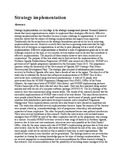| dc.description.abstract | Strategy implementation is a key stage in the strategic management process. Research however shows that many organizations are unable to implement their strategies effectively. Effective strategy implementation has therefore become a major challenge to organizations. A review of literature shows that the subject of strategy implementation has largely been neglected. Traditionally the focus has been on the strategy formulation process as the key to achieving implementation success. However recently there has been a growing awareness that the high failure rate of strategies in organizations is not due to poor planning but is a result of poor implementation. Effective implementation is therefore a must if organisation goals are to be met. Although research on the topic is very limited, several studies exist on factors that contribute to effective implementation. The majority of these studies however have been carried out in corporations.
The purpose of this case study was to find out how the implementation of the Northern Uganda Rehabilitation Programme (NUREP) was carried out effectively. NUREP is a government of Uganda programme sponsored by the European Union (EU). The programme operates within the framework of the Government of Uganda 2007 Strategic Plan (Peace, Recovery and Development Plan). The strategic plan is aimed at stabilization and economic recovery in Northern Uganda, after more than a decade of war in the region. The objective of the study was to establish the factors that influenced implementation at NUREP.
Face to face interviews were conducted using structured questionnaires. A total of 10 people were interviewed from the NUREP Programme Management Unit (PMU), Office of the Prime Minister, the supervisory body of NUREP, Gulu district, and NUREP implementing partners. Written transcripts of the data collected were then made. Data was then analysed using content analysis and with the aid of a computer software package (NIVIVO 9). The key findings of the research were then summarized using various tables.
The results of the research showed that the successful implementation of NUREP was a result of several factors. The main factors however were people related factors, such as staff commitment, involvement of people, good working relations with stakeholders particularly local governments, and a competent Programme Management Team.Implementation controls were also found to have played an important role and. The study also identified several implementation barriers. Again the majority of the barriers were people related eg. misunderstandings, lack of programme ownership, and inadequate capacities of some employees. The other frequently mentioned barrier was political interference.
There were several limitations in this research. Firstly the interviewees only included senior managers from NUREP as most of the other employees had left, as the programme was coming to a closure. Secondly NUREP activities covered a wide range of districts in Northern Uganda, however due to time and cost constraints, interviews were only possible at the Gulu District Office. Also for the same reason only two of NUREP’s implementing partners also in Gulu were interviewed. Also the fact that the interviews took place towards the end of the year, meant that many people could not be reached as this is usually a busy time in most organizations. The results of this research may therefore not be generalized. The findings however are nevertheless important in closing the existing knowledge gap on the topic of strategy implementation.
There are several managerial recommendations and recommendations for future research relating to this research. One recommendation is that the possibility of including senior managers from the Programme Management Unit in the planning or design phase of future programmes should be explored. There is also need to involve and consult as many stakeholders as possible prior to the planning of future programmes. The interests, expectations and level of participation of stakeholders including areas of potential conflict should be clearly identified. There is also need to ensure that people with the necessary skills are recruited for the job. Implementation requires much time and it is therefore crucial that sufficient time is allocated to the entire process.
The recommendations for future research are twofold. Firstly studies relating to the role of people
in strategy implementation have tended to concentrate on top and middle managers. Few studies exist on how lower level employees and stakeholders external to an organisation influence the implementation process. More research is therefore needed in this area. Further existing studies on strategy implementation focus on organizational aspects. There is need to explore other factors other than organizational factors. | en |


